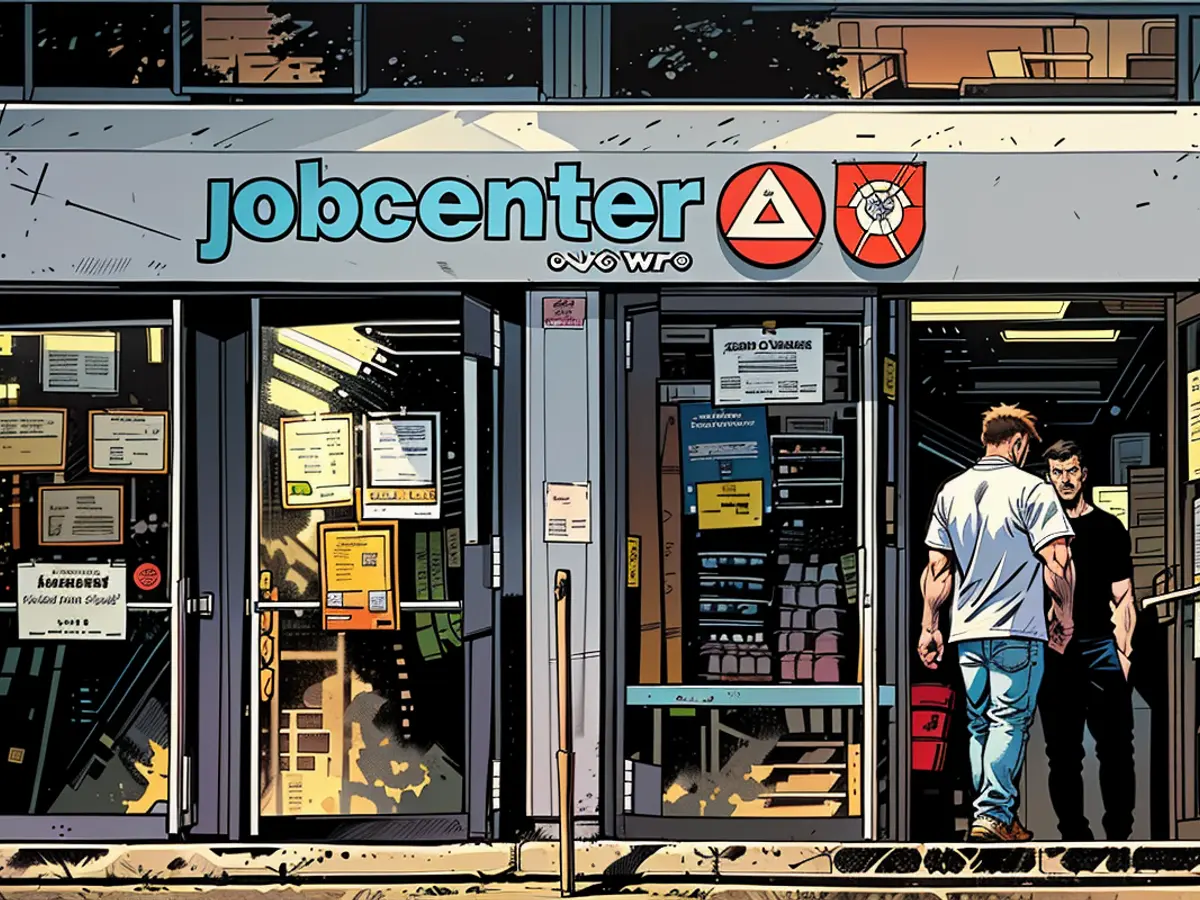Warum die Börse wieder ausflippt
Der Dow Jones Index stürzte am Montag bei Handelsbeginn um mehr als 1.000 Punkte ab, und der breitere Markt fiel um 3%. Der Nasdaq, der risikoreiche Technologieaktien enthält, verlor 3,7%.
All dies geschieht während eines globalen Börsenabschwungs. Der japanische Nikkei 225 Index stürzte um 12% ab - sein historisch schlechtester Tag. Alle wichtigen asiatischen und europäischen Börsen fielen am Montag deutlich.
Drei Ängste treiben die Märkte gleichzeitig in den freien Fall: wachsende Sorgen vor einer Rezession, die Sorge, dass die Federal Reserve nicht schnell genug gehandelt hat, und die Überzeugung, dass große Wetten auf KI nicht aufgehen werden.
Rezessionsängste
Die prominenteste Sorge ist die, dass die US-Wirtschaft in einer deutlich schlechteren Verfassung ist, als bisher angenommen - was durch den unerwarteten Anstieg der Arbeitslosenquote am Freitag belegt wird.
Am Freitag berichtete das Bureau of Labor Statistics, dass die US-Wirtschaft im Juli nur 114.000 neue Jobs geschaffen hat - deutlich weniger als erwartet - und die Arbeitslosenquote auf 4,3% stieg. although this is not an unhealthy unemployment rate in itself, its sudden rise is alarming: Last year, the unemployment rate was at its lowest level since the moon landing.
To be clear: The US economy remains strong. Last quarter, it grew way more than expected, boosted by still-robust consumer spending, which makes up more than two-thirds of all gross domestic product.
But recession fears are mounting. Goldman Sachs economists Monday raised the odds of a recession to one in four in the next 12 months. That’s still a “limited” case, because the economic data looks strong overall and the Fed has plenty of room to reduce rates from a 23-year high.
But Goldman’s recession chances are still 10 percentage points higher than they were before Friday’s jobs report, which it called “more concerning now.”
Fed-Bedenken
The stock market had hit record after record this year, buoyed by falling inflation and the growing sense that the Fed would shift from its series of aggressive rate hikes and start to rate cuts, which can boost corporate profits.
But the Fed didn’t cut rates as many had hoped last week. The market increasingly views the Fed’s patience as a mistake.
The Fed is notoriously horrible at timing its rate cuts and hikes. It was way behind the curve on inflation and had to catch up with multiple historic rate hikes in 2022 to tame runaway prices. Likewise, some economists believe the Fed should have started cutting rates sooner.
Rate cuts could help support the job market by cutting borrowing costs for businesses and freeing up money for companies to spend on hiring. But policy decisions take time to work their way into the economy. As inflation has cooled dramatically in recent months and the unemployment rate has risen, some fear the Fed may be too late to act before slow hiring turns into rampant layoffs.
The Fed’s next meetings are scheduled for September, November and December, Analysts at Citigroup and JPMorgan predict the Fed will slash rates by half a point at its next two meetings. But that may be too late. It may be forced to make an emergency rate cut before then - an extraordinary intervention the market increasingly views as likely, according to CME’s FedWatch tool.
An emergency cut - which hasn’t happened since the early days of Covid, is exactly what the Fed needs to do, said famed Wharton professor emeritus of finance Jeremy Siegel on CNBC Monday morning.
“It’s so far behind the curve right now. I mean the Fed is up in the bleachers,” said Siegel. “You take a look at the data; it’s not at all comforting.”
KI-Bedenken
Stocks had also been flying high over the past two years because of big bets on tech companies involved in artificial intelligence: Many hoped that AI would create another global industrial revolution.
But AI profits are basically nonexistent, and the unproven technology isn’t yet ready for prime time. Some fear it’ll never get there. Traders are beginning to unwind big trades on Apple, Nvidia, Microsoft, Meta, Amazon, Alphabet and other tech stocks that had been surging since the beginning of last year.
Warren Buffett - CEO of Berkshire Hathaway and a notoriously calm force when markets go haywire - is also ditching tech. He just sold half of Berkshire’s Apple stake, which is a troubling sign for the health of the tech sector.
Because those companies are each worth close to $1 trillion or more and make up an enormous chunk of the overall value of the S&P 500, when investors sell off tech stocks, that has a massive detrimental effect on the broader market.
Was kommt als nächstes?
Investoren fliehen in die Höhe. Sie verkaufen Öl, Krypto und insbesondere Tech-Aktien. Stattdessen fließen sie in sichere Häfen wie Anleihen, was die Renditen für Staatsanleihen senkt.
Das könnte für einige Leute, die in Rente gehen, Probleme bedeuten. Aber Menschen, die kurz vor der Rente stehen, könnten profitieren, wenn sie eine hohe Mischung aus Anleihen haben, die von der Flucht in die Sicherheit profitieren.
Geringere Zinsen, wenn die Fed folgt, könnten dazu beitragen, hohe Hypothekenzinsen, Autokreditzinsen und andere Verbraucherkreditkosten zu senken. Es könnte jedoch bedeuten, dass Menschen mit Geld auf Sparbüchern in den kommenden Monaten weniger Zinsen erhalten.
Eines sollte man nicht tun: in Panik geraten. Das ist kein Börsencrash. Noch nicht jedenfalls. Investoren sind nervös, aber nicht in Panik. Montags Einbruch, wenn er bei den aktuellen Kursen endet, würde nicht einmal die Top 100 schlechtesten Tage an der Börse knacken.
Die einzige Frage jetzt: Wie lange wird diese Angst anhalten, bevor Investoren eine Kaufgelegenheit wittern?
Investoren überdenken ihre Geschäftsstrategien aufgrund der wachsenden Rezessionsängste, wie die unerwartete Steigerung der Arbeitslosenzahlen und das langsamer als erwartet verlaufende Job-Wachstum zeigen. Das löst Bedenken aus, dass die Unternehmensgewinne durch eine Verlangsamung der Einstellungen oder Entlassungen negativ beeinflusst werden könnten.
Angesichts der aktuellen Marktbedingungen erwägen einige Investoren, ihre Investments von Tech-Aktien wegzulenken, die stark von der Hype um künstliche Intelligenz beeinflusst wurden. Die Erkenntnis, dass die AI-Gewinne derzeit nicht substanzial sind und dass die Technologie möglicherweise nicht so ausgereift ist, wie zuvor geglaubt, hat zu einem Verkauf von Tech-Aktien wie Apple, Nvidia, Microsoft, Meta, Amazon und Alphabet geführt.







